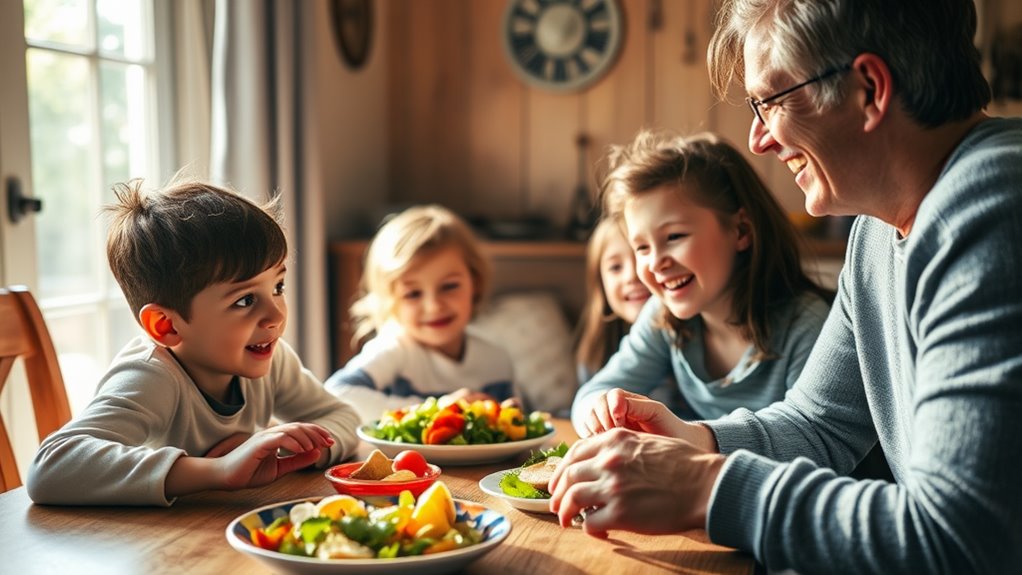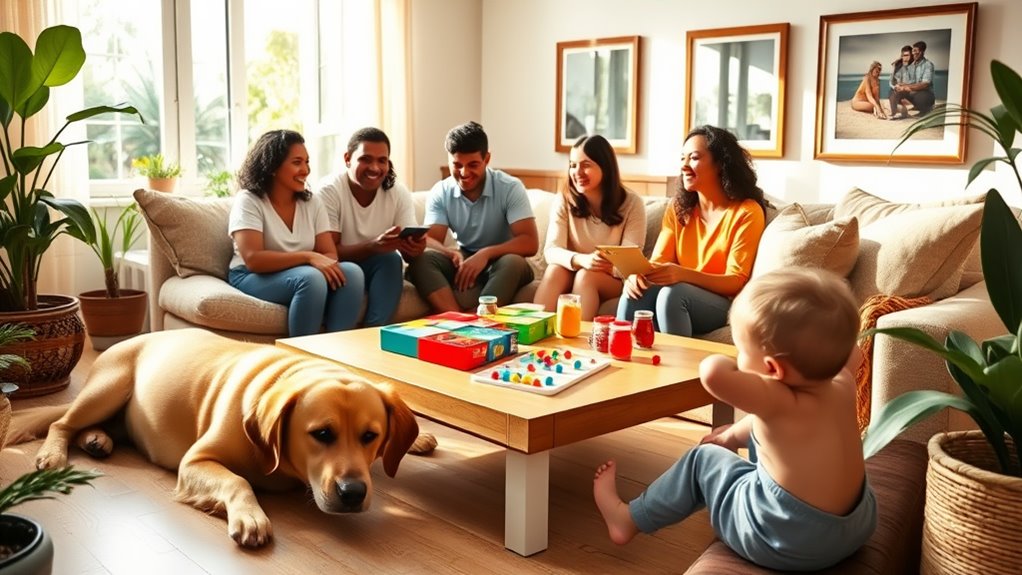How Family Dynamics Shape Your Child’s Future!
Family dynamics play a crucial role in shaping your child’s future. Your interactions influence their emotional resilience, social skills, and cognitive growth. When you encourage open communication, you help them develop trust and empathy, essential for building strong relationships. Sibling rivalry and cooperation teach problem-solving and negotiation skills, while positive reinforcement nurtures confidence and ambition. A supportive home environment fosters critical thinking and adaptability, preparing your child for life’s challenges. By understanding these dynamics, you can empower your child to thrive. There’s more to explore about how these influences can set the stage for their lifelong success.
Key Takeaways
- Family roles nurture empathy and social skills, shaping children’s emotional intelligence and future relationship dynamics.
- Open communication fosters trust and resilience, equipping children to navigate challenges in adulthood effectively.
- Sibling interactions teach conflict resolution and negotiation skills, essential for future teamwork and collaboration.
- Supportive environments enhance cognitive growth, encouraging curiosity and critical thinking, vital for lifelong learning.
- Positive reinforcement in family dynamics builds confidence, motivating children to pursue their ambitions and handle failures.
Understanding Family Dynamics
In the heart of every home, family dynamics shape a child’s experience and future in profound ways. You might not realize it, but the roles each family member plays can significantly influence a child’s personality and behavior. For instance, if you often find yourself in a nurturing role, your child may develop strong empathy and social skills. Conversely, if you’re more authoritative, your child may learn to seek validation through achievement.
Moreover, the communication patterns within your family are crucial. Open and honest dialogue fosters trust and emotional intelligence, while poor communication can lead to misunderstandings and resentment. When children witness constructive discussions, they learn the importance of expressing their feelings and resolving conflicts.
Understanding these dynamics allows you to reflect on how your family’s structure and interactions impact your child’s development. Are you nurturing a supportive environment? Are you modeling effective communication? By examining these aspects, you can consciously shape your child’s future, empowering them to navigate their own relationships with confidence and resilience. Ultimately, recognizing the nuances of family roles and communication patterns helps you create a positive foundation for your child’s lifelong journey.
Emotional Development and Family
Your family’s emotional landscape shapes how you process feelings and navigate relationships. The influence of your parents and the dynamics with your siblings play crucial roles in your emotional growth. Understanding these connections can help you foster healthier interactions and a more resilient sense of self.
Parental Influence on Emotions
Navigating the intricate landscape of emotions, parents play a pivotal role in shaping their children’s emotional development. Your influence extends far beyond the immediate environment; it lays the foundation for emotional resilience. When you model healthy emotional expression, your child learns to name and understand their feelings, fostering a secure base from which they can navigate life’s challenges.
Parental support is crucial during this journey. By actively listening to your child and validating their emotions, you create a safe space for exploration. This support reassures them that it’s okay to feel a spectrum of emotions—from joy to sadness—and that they’re not alone in their experiences. Helping them process these feelings equips them with tools to cope with adversity, enhancing their emotional intelligence.
Moreover, as you share your own emotional experiences, you provide real-life lessons in vulnerability and strength. Encouraging your child to discuss their feelings openly not only builds trust but also strengthens their emotional toolkit. Ultimately, your engagement in their emotional development cultivates resilience, preparing them for a future where they can navigate relationships and life’s complexities with confidence and grace.
Sibling Relationships and Growth
Emotional growth doesn’t occur in isolation; it’s often shaped by the interactions and relationships within the family, particularly among siblings. Your child’s emotional development is significantly influenced by their experiences with siblings, where sibling rivalry and cooperative play play pivotal roles. Rivalry, while often perceived negatively, can foster resilience and coping skills. When your children compete for attention or resources, they’re learning to navigate complex emotions like jealousy and frustration. These experiences can prepare them for future social interactions.
Conversely, cooperative play offers a contrasting but equally valuable avenue for growth. When siblings engage in shared activities, they cultivate empathy, communication, and problem-solving skills. These positive interactions help them build strong emotional bonds, reinforcing the importance of collaboration over competition.
As you guide your children through these dynamics, encourage open dialogue about their feelings. Help them recognize the lessons embedded in both rivalry and cooperation. By fostering a balance between these experiences, you’re equipping your children with the emotional tools they’ll need for healthy relationships throughout their lives. Ultimately, sibling relationships can serve as a microcosm for navigating the complexities of social interactions in the broader world.
Social Skills and Relationships
Building strong social skills and relationships is essential for a child’s development, shaping their ability to connect with others and navigate the complexities of social interactions. As you foster peer interactions, you’re not just facilitating friendships; you’re also enhancing their social awareness and emotional intelligence. Understanding group dynamics allows your child to adapt their communication styles, making them more effective in various social contexts.
Empathy development is crucial here. When children learn to appreciate diverse perspectives influenced by cultural backgrounds, they build a foundation of trust formation in their relationships. This trust is vital for friendship building, as it encourages open dialogue and mutual respect.
Moreover, equipping your child with tools for conflict navigation can significantly impact their social competence. By modeling how to resolve disagreements constructively, you’re preparing them to face challenges head-on. In essence, the interplay of these elements—peer interactions, social awareness, and emotional intelligence—will empower your child to create meaningful relationships throughout their life. As you nurture these skills, you’re not just shaping their present but also paving the way for a more fulfilling future.
Cognitive Growth Influenced by Home
The environment at home plays a significant role in shaping your child’s cognitive growth. When you create a space rich in cognitive stimulation, you’re essentially laying the groundwork for their future intellectual development. Children thrive in learning environments that encourage curiosity, exploration, and critical thinking. Your engagement in their learning—whether through conversations, reading together, or encouraging play that challenges their problem-solving skills—can significantly enhance their cognitive abilities.
It’s essential to recognize that cognitive growth isn’t just about formal education; it’s about everyday interactions. Simple activities, like discussing the day’s events or exploring new concepts together, foster a love for learning. This approach nurtures their ability to think independently and approach challenges with confidence.
Furthermore, the emotional climate of your home contributes to cognitive development. A supportive and encouraging atmosphere allows your child to take risks, ask questions, and make mistakes—vital components of effective learning. By prioritizing cognitive stimulation and cultivating diverse learning environments, you empower your child to develop crucial skills they’ll carry into adulthood. Invest in their cognitive journey today, and you’ll pave the way for a brighter, more intellectually curious future.
Parenting Styles and Their Impact
How does your parenting style shape your child’s development? Your approach—whether authoritative or permissive—can significantly influence your child’s ability to reach developmental milestones. Authoritative parenting, with its blend of warmth and structure, often cultivates resilience and independence. In contrast, permissive parenting may lead to challenges in establishing boundaries, creating potential parenting conflicts as your child navigates expectations.
Cultural influences also play a vital role in shaping your parenting expectations and techniques. Understanding the dynamics of your background can help you tailor your discipline techniques to be more effective. Consistency in your approach is crucial; children thrive when they know what to expect. If your discipline varies from day to day, it can lead to confusion and frustration.
As you reflect on your parenting style, consider how it aligns with your values and the lessons you wish to impart. Striving for balance between nurturing and guidance will not only support your child’s growth but also enhance your relationship. The goal is to foster an environment where your child feels secure and empowered, ready to tackle life’s challenges with confidence.
Sibling Relationships and Development
Sibling relationships play a crucial role in shaping your child’s social skills and conflict resolution strategies. As they navigate disagreements and form bonds, they’re learning valuable lessons that extend beyond the family unit. Understanding this dynamic can help you foster a supportive environment that enhances their growth and development.
Impact on Social Skills
Many families experience the unique dynamics that arise from having multiple children, and these relationships can significantly shape a child’s social skills. When siblings interact, they engage in a variety of peer interactions that teach them essential life lessons. These formative experiences help children develop crucial communication styles, influencing how they relate to others outside the family.
- Empathy Development: Siblings often learn to read emotional cues, fostering empathy.
- Conflict Management: Navigating disagreements prepares them for external social challenges.
- Negotiation Skills: Cooperation in play helps refine their ability to negotiate.
- Role Modeling: Older siblings often set examples, directly affecting younger siblings’ behavior.
Through these interactions, children learn to express themselves clearly and understand the perspectives of others. This foundational skill set is invaluable as they form friendships and relationships beyond the family unit. By nurturing positive sibling dynamics, you’re not just shaping their relationships at home; you’re equipping them with the tools they need to thrive socially in diverse environments. Investing in these connections can lead to significant benefits in their overall development and future social success.
Conflict Resolution Strategies
Navigating the complexities of sibling relationships often involves conflict, which can serve as a valuable learning opportunity for children. By teaching your kids effective conflict resolution strategies, you’re equipping them with essential skills that will benefit them throughout life. Start with active listening. Encourage your children to genuinely hear each other out, acknowledging feelings and perspectives. This fosters empathy and reduces defensiveness, allowing for a more productive dialogue.
Next, introduce mediation techniques. When conflicts arise, guide them in discussing their issues openly, suggesting they take turns articulating their viewpoints without interruption. This structured approach not only clarifies misunderstandings but also cultivates a sense of fairness. You might also encourage brainstorming solutions collaboratively, which empowers them to take ownership of the resolution process.
Lastly, model conflict resolution yourself. Demonstrating how you navigate disagreements can provide a practical framework for your children. They’ll learn that conflict isn’t inherently negative; rather, it’s an opportunity for growth, understanding, and strengthened relationships. By instilling these skills, you’re setting the foundation for your children to become adept communicators, problem solvers, and empathetic individuals in their future interactions.
Long-Term Effects on Future Success
The dynamics within a family can significantly shape a child’s future success, influencing everything from their self-esteem to their problem-solving abilities. When children grow up in an environment that fosters a positive success mindset, they’re more likely to seize future opportunities and navigate challenges effectively.
- Resilience: A supportive family teaches kids to bounce back from failures.
- Confidence: Positive reinforcement builds self-assurance, essential for pursuing ambitions.
- Adaptability: Exposure to diverse perspectives encourages flexible thinking.
- Empathy: Strong family relationships cultivate emotional intelligence, crucial for teamwork.
These long-term effects of family dynamics are profound. For instance, children who experience open communication tend to develop critical thinking skills, enabling them to tackle complex problems in adulthood. Moreover, a nurturing environment instills a belief in their capabilities, motivating them to take risks and pursue their goals. As you reflect on your family dynamics, consider how your approach can lay the groundwork for your child’s success. By fostering a positive atmosphere and encouraging growth, you can help them build the resilience and confidence they’ll need to thrive in an ever-changing world.
Frequently Asked Questions
How Do Family Dynamics Affect Academic Achievement in Children?
Family dynamics directly influence academic achievement by shaping your child’s academic motivation. When you’re involved, it fosters a supportive environment, encouraging persistence and a love for learning, ultimately enhancing their performance and success in school.
Can Family Structure Influence a Child’s Career Choices?
Imagine a garden where seeds flourish or wither. Family structure shapes your child’s career aspirations, as parental expectations often guide their paths. Support and encouragement can cultivate ambition, while pressure may stifle creativity and exploration.
What Role Do Extended Family Members Play in Development?
Extended family members significantly impact development. Your child benefits from grandparent involvement, gaining wisdom, support, and stability. Strong cousin relationships foster social skills and resilience, enriching their emotional landscape and helping them navigate life’s challenges effectively.
How Do Cultural Differences Impact Family Dynamics?
Cultural differences significantly shape family dynamics, influencing parenting styles and cultural values. You’ll notice how these differences affect communication, discipline, and emotional expression, ultimately impacting your child’s development and their understanding of relationships.
Are Single-Parent Households Detrimental to Child Development?
Studies show that children from single-parent households often face unique challenges, yet they can develop remarkable emotional resilience. Your support and understanding can help navigate these difficulties, fostering strengths that benefit their overall development.




